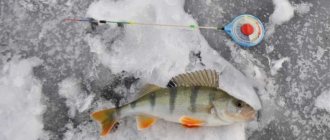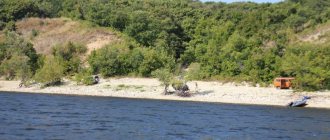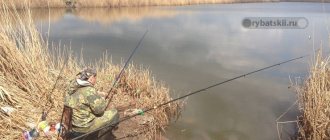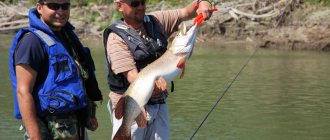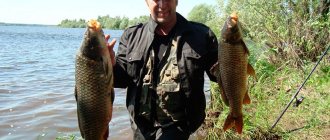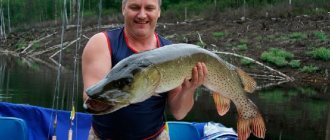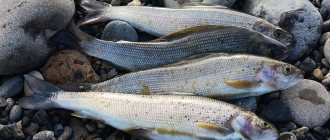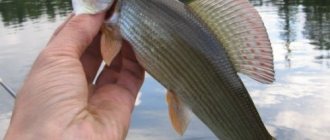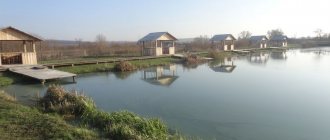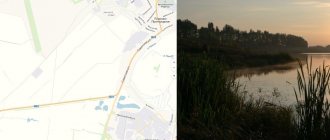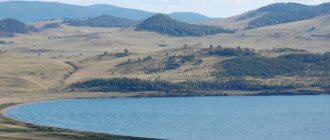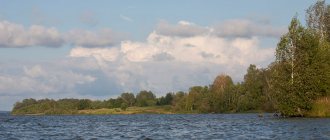Greetings my reader. Today, on the first day of my vacation, I’m going to wonderful fishing spots in the Perm Territory, where now I can fish with pleasure! Tomorrow I’m leaving for Okhansk.
There is a real expanse for fishing here: the Kama and Ocher, intercepted by the dams of small power plants, there are magnificent fishing grounds in the ponds.
What kind of fish is there not here? There are all kinds -
- from the prickly perch to the handsome ide,
- from predatory pike to the night robber burbot!
Near Okhansk, however, from the opposite left bank, the Yug River and the small Shanai River flow into the Kama. The South receives the cold Tatarka; in its forest pools you can catch large grayling.
There are many lakes around Okhansk. On the Kama water meadows - Okulovskoe; The lakes on Pershinsky Island, eight kilometers from the city, are especially rich in crucian carp - Dolgoye, Krugloye, Shumikhinskoye.
The destructive waters of a paper mill
In the evening of the next day I get off the intercity bus: in the summer it only goes to the bank of the Kama River, and then crosses on a ferry, a large barge that can accommodate more than ten cars. The barge is towed by the boat Lasva, named after the river of the same name, which flows into the Kama near the city of Krasnokamsk, where there is a large paper mill, the wastewater of which has defished the Kama for many kilometers.
When you fly here by plane, you can see how a muddy whitish stream, gradually expanding, covers the entire width of the Kama, and almost to the city of Nytva the water has a characteristic hue. Fishermen traveling along the Kama by boat to more favorable fishing spots catch large, dead fish, with their sides swollen from swelling.
You won’t believe that here used to be the richest sand spits, where they caught a lot of such valuable fish as sterlet. Now its capture is considered rare. And how many bream, the inhabitant of the deep Kama pits, died! It is impossible to count the millions of losses caused to the fisheries of the Kama, and other rivers, by wastewater from industrial enterprises. And the fish, if it could, would shout:
- Save us - we are dying from the valuable products that you people are releasing into the Kama water.
But I got a little distracted from the main topic. So, I’m on the bank of the Kama near Okhansk. The harmful water pollution almost never reaches here anymore.
Luckily the ferry is on this side. In thirty minutes I’ll go to the bridges in the village of Krivosheino. Part of this village, located on a rather steep bank, was demolished: the waters of the Votkinsk reservoir flooded this place and almost all of the Ocher meadows. The new Kama Sea is noisy, delighting the fisherman’s heart.
I spent the rest of the evening in the garden hunting for red dung worms. Then I adjusted the fishing rods. In the morning it was decided to go to Ocher.
Where can you catch perch in the Perm region
The Saigatka River originates in Maly Savino and flows into the Kama River. These places will be one of the options for perch fishing in the Perm region. The nearest regional city is Izhevsk. From Izhevsk you need to drive 90 km to the city of Tchaikovsky. Through Chaikovsky on the federal highway you need to drive 18 kilometers until you turn to the village of Rusalevka and then to the Vankovskoye settlement. From Tchaikovsky there are buses to the village of Rusalevka, the Energia hospital complex, the village of Opara, the village of Vanki, the village of Zasechny, the village. Vassyata. The Saigatka River flows along the entire route and if you get off the bus in any of the listed settlements and go a little deeper into the forest, you will definitely come across this river.
The road is paved to the village of Opara, and then to the village of Vassyata there is a dirt road for about 25 kilometers. If you don’t stop and drive another 20 kilometers along the dirt road through Vanki, Stepanovo, Zasechny and Vassyata, you will reach the Kama River. But this is a completely different fishing. If you drive from Perm, it is about 300 km towards Tchaikovsky. It’s a bit far to travel here on purpose, especially since perch fishing in the Perm region is not limited to the vicinity of Tchaikovsky.
A beautiful place with a quick bite of ruffs
The next morning dawned clear, although a little windy, and the wind, as luck would have it, was northwest. Fishing began above the Okulovsky bridge, on the bend of the Ocher; there is a deep hole with a steep limestone bank. The fish loves to stay in this curve.
There are many stones at the bottom of the pool; they reliably protect the fish from nonsense and confusion. Breeders bypass this deep rocky place. The right bank is very picturesque: a steep mountain approaches the water itself, densely covered with fir and spruce; at its foot flows a small spring with crystal clear cold water, pleasant to the taste.
I start fishing from a small sandy island, at the exit of the hole. I cast the bottom fishing rod and a quick bite follows almost immediately. I pull out a river urchin - Ruff Ershovich, Shchetinnikov’s son. The ruffs are literally overwhelming, but I miss fishing, and I don’t want to leave this beautiful place.
Suddenly the end of the fishing rod attached to the slingshots swung sharply... I make a hook - something strong is trying to snatch the fishing rod from my hands. I give up some fishing line and try to let the fish in again, but... it lets me down; the line has weakened. I pull out the fishing rod - the float and sinker are in place, there is no hook.
Saturn is 0.3 millimeters cut like a razor! Obviously, the pike, coveted by the river urchin, took my hook as a souvenir along with the ruff. I am converting one of the fishing rods to a live bait one, attaching a metal leash. I bait another ruff on the hook. But he was not destined to die that day. The hot sun began to heat up, the ruffes were pecking non-stop. I gave up on such fishing and decided to take a swim. Then we had to climb higher, under the elm tree. Here I caught a small white bream and a couple of chubs using a white jig while trolling in a plumb line. Soon the fish bite stopped.
I swam again and went down the Ocher to look for new, better places for fishing, where there is a real bite. The Kamskaya hydroelectric power station discharges flood waters; in the lower reaches of the Ocher there is a backwater; there is no current. The river overflowed quite widely, but did not overflow its banks.
I stop near the large willows bending towards the water and involuntarily freeze: a flock of large chubs swims near the surface. I hastily unwind the fishing rod and cast it. But hopes are not justified: the chubs swim past the worm completely indifferently, not paying any attention to it. Occasionally they swim up to the float and, splashing their tail, move away to the side.
Oh, grasshoppers! Yes, they are not there yet: it was a cold year. We managed to catch two flies on the bark of a thick willow. Baited it on a hook. I made a cast. Almost instant bite. I brought out a good chub. But flies are not so easy to find.
It's starting to get dark. Some insect fell from a willow branch into the water - and immediately a breaker broke up in this place: the insect disappeared. I start to look closely at the leaves of the tree, and suddenly, oh joy! Dozens of small weevils are crawling along the sharp leaves of the willow; they are now in mating season.
About twenty minutes later I have a matchbox full of bugs in my hands; they scratch at the walls, protest against forced captivity. Now that's another matter! Careful casting. A sharp bite and a large chub goes into the basket. Then I pull out a small chub, two more chubs, and the bite stops.
I have to change my place and go down two hundred meters. Again a few good bites, the basket becomes heavier. The sun disappears behind the forest, and mosquitoes begin to pester insects.
I quickly reel in my fishing rods and take a shameful flight. Clouds of mosquitoes are chasing me from behind, as if shouting: “Der-zhzh-iii... her!”
Great pleasure from a wonderful bite
The next day I decided to go to Tatarka, where the fishing spots promised me numerous graylings. I crossed the Kama again, then took a passing car to the village of Gari, three kilometers from the Kama. Here, while flying by plane about two years ago, I noticed a small mill pond.
He got me interested. But the mill did not live up to my hopes: although there were a lot of fish in the pond - a sorog splashed almost every minute, trying to grab large dragonflies flying over the water - the fish refused to bite the fishing rod.
“We have enough food,” the miller explained to me. - But in the South, lower down, there is a good hole: there are a lot of chub, but they don’t take the bait well. Cunning fish.
- How far is it?
- No, it’s almost very close. Let's go together, I also want to fish.
In the horsetail thickets surrounding the pond, I managed to catch up to a dozen dragonflies that had just emerged from the gray diving shell of the former larva. We call it a booger, some people, however, very rarely call it a goat. Dragonfly is one of the best baits for large chub.
Fifteen minutes later we were at the pool. Here a huge poplar fell into the water, blocking the entire river. Above the pool there is a narrow branch of the riffle. Several alder trees hung over the water. I attach a dragonfly to the hook and carefully, from behind the alder, make a cast.
The river current picks up the bait and carries it into the pool, and I gradually drop the line from the reel. Almost at the very branches of the poplar my dragonfly disappears, and a large circle diverges on the surface of the water. I'm making a move...
The hand feels resistance. I begin to reel in the reel. At first the fish walks calmly, but, noticing me, it takes off like an arrow into the pool, reeling in about four meters of line. Fighting large chub always gives me great pleasure. You can walk tens of kilometers to find such a fishing spot from the shore with such a wonderful bite! Soon I managed to bring the black-backed beauty, as if in tow, onto a gentle gravel bank. In just half an hour I caught six wonderful chubs. The miller was very surprised by such luck.
“If we get one or two out in a day, that’s very good!” I’ll definitely buy myself a reel, otherwise it’s difficult to outwit a chub with a simple fishing rod: he’s too careful and strong - he’ll tear the line in an instant!
I photographed the pool and set off along the designated route to Tatarka. On the way we had to swim twice: the sun was unbearably hot. An hour later, pursued by countless hordes of mosquitoes, I was making my way through the willow thickets to the shore of the Tatarka River. However, I was unfortunate: it had recently rained in these places, and the water in the river was muddy, like mash. Grayling fishing is postponed indefinitely.
Content:
- 1 Features of fishing in winter in the Perm region 1.1 Features of weather conditions
- 1.2 Where to fish in winter?
- 2.1 Where to catch perch
- 3.1 Fishing base "Kama"
- 5.1 If you fall through the ice, what should you do?
Winter fishing is the destiny of real fishermen. Not everyone will agree to spend their free time in real cold conditions on a pond covered with a layer of ice, near a hole with a fishing rod. The same can be said about the fishermen of the Perm region, where there are all conditions for fishing in winter.
The last refuge of fish is the bottomless mill pool
The next day I moved to the village of Kultaevo, located twenty-five kilometers from the regional center on the Kazan highway.
In the evening I already fished on Nizhnyaya Mulyanka, near the destroyed Telkanovskaya mill, the pond of which used to be replete with large perch, and in the deep pool under the mill there were large pikes and many chubs. About six years ago the pond burst, the perches were caught with dragnets; the undermill pool is filled with silt from the former pond.
In a hole where the best divers previously could not reach the bottom, it is now unsafe to dive. The greatest depth is two meters. Large chub and large pike have become rare. But what’s interesting: there have never been any ides in the pit before, and in recent years, apparently due to the closure of the Kama, a huge number of small ides have entered Nizhnyaya Mulyanka.
They literally walked like a black cloud along the bottom of the river along with the perch fry. Most of the fry were caught by predators; only a small number of them were preserved in the undermill pit. A very muddy bottom, on which frequent snags are inevitable, protects fish from being caught with undershots (parts of nonsense made from a bag; its cell does not allow even the smallest minnow to pass through; - a real poacher's tackle!).
Over the course of a year, the kids have grown up. For Kultaevsky children, catching yazyats with a fishing rod is the main type of fishing. They peck continuously, and the boys' kukans are constantly studded with hundreds of fish, slightly larger than the index finger. In the same way, a lot of small perch are caught.
Fish cannot penetrate above the log bridge of the mill. It’s a pity: there are quite a few deep, snaggy pools there, where fish with perches would find a good shelter and reliable protection from lovers of nonsense and shallow water, and after a few years they could please any angler with an excellent bite. And from the last refuge of the fish, the once bottomless pool of the mill, in two or three springs there will be only a shallow puddle.
The river is also becoming very shallow. Even at the Kultaevsky Bridge, where collective farm breeding stallions used to be bathed, now poultry are wading.
Once upon a time, the dam of the Sarabaikhinskaya mill, which held the water of two rivers - the Mulyanka and Sarabaikha - burst, and a deep, beautiful pond teeming with fish, the pride of the surrounding villages, disappeared. The river began to become shallow, and the mill pond was quickly washed away with silt and gravel. They wanted to restore it, but, go ahead, they gave up! They installed a new electric mill not far from the Sarabaikhinskaya mill. It's a good thing, of course. But they forgot about state farm reservoirs. And the river becomes shallow, losing wonderful places for fishing, and large fish also disappear with them.
Nowadays, it’s rare that a small chub will swim by, and no wonder: the depth is only waist-deep! With the breakthrough of the Topasikha mill, above the village of Bash-Kultaeva, large grayling disappeared in the upper reaches of the Mulyanka, and there were no perch at all. And how much of it was there before! And along the entire river you are unlikely to find a pool where you can dive properly.
In the hot season there is a place to take a dip, but to really swim, walk one and a half to two kilometers from the village to the former Telkanovskaya mill. You take a good bath, but by the time you go back, the heat will wear you down again.
Is it really impossible to restore the ponds in the village of Kultaevo? The local state farm is a millionaire and has enormous reserves. The management is exemplary. And, of course, he needs a good pond.
What a wonderful, huge pond could be built near the former Sarabaikhinsky mill! It could rotate the turbines of a small power plant; mirror and common carp and waterfowl would be bred here. A high backwater of abundant water would saturate the roadside plots of land occupied by vegetable gardens with moisture. But wouldn’t a large reservoir be of much use to a strong, prosperous economy? And what pleasure the sports fishermen would get - there are many of them in the village. These are people of various ages and professions, and all of them, of course, will take an active part in cleanup work during the construction of the pond. A pond is their common desire, as well as many of the advanced workers of the state farm. And how he would decorate a large tract village, where in the hot summer people are suffocating from dust! And what a good rest people could have on the shore of their pond.
People who know the value of their work know well the value of well-deserved rest. And if this rest is provided to them, then they will work many times better.
Fishing with an overnight stay in the lower reaches of the Mulyanka
The next day I went outside the village of Mokino. Chub bit at the Mokinskaya pit. There are no grasshoppers yet, so we have to look for a variety of insects and caterpillars for bait in the coastal alder thickets, which the chub takes well on.
I accidentally caught a wasp, tore off its sting with tweezers and placed it on a hook. I cast it without much hope of success, but it took the bait almost immediately. With difficulty I brought out a large chub. This surprised me a little.
Obviously, the bright protective coloring of this unusual insect, which land dwellers know so well, does not frighten underwater inhabitants at all. The wasp sits very tightly on the hook, and I managed to catch four more chubs with it.
The next day I didn't fish. I came to the mill early in the morning. She carefully looked around the corner. In the water, illuminated by the sun, hundreds of yazyats and small galavliks stood motionless. A careless movement - and the fish - were blown away by the wind.
In the evening we went from an overnight stop to the lower reaches of the Mulyanka to catch burbot. At night the weather changed sharply: a strong wind blew and cold rain began to drizzle. The forest on Glyadenovskaya Mountain was literally groaning. The air temperature was dropping quickly. At ten o'clock I caught a ruff. An hour later, my friend pulled out the loach. At twelve we decided to reel in the fishing rods.
We walked in complete darkness along a forest path. The smell of bird cherry was intoxicating: there are a lot of them blooming this summer. When we entered the meadow, I saw a sparkling emerald in the grass. This small light against the backdrop of a black, cold night reminded me of something fabulous. The emerald turned out to be an Ivanovo firefly worm. Another one was found nearby.
In the morning the north wind blew, but the day was clear and sunny. Small perch and large minnows were constantly biting. During the whole day, only one angler managed to catch eight hundred grams of perch.
Melnik assures that there are plenty of large perch in the pond. We'll have to come back here in good weather.
Perch fishing on the dam
Fishing in the Perm region for perch is not only about fishing on the river, be it large like the Kama or such as Saigatka. In the area of the Energy complex there is a dam, thanks to which a large pond was formed. This is a favorite place for all fishermen, since the reservoir is located along an asphalt road, the coastal area is concreted, and you can get there by vehicle in any weather and at any time of the year.
In summer, snakes like to bask on hot concrete; this is not a suitable place for a family holiday, so mostly only fishermen gather here. In a word, this is a very convenient place for those who do not like to go deep into the forest. Every local driver carries a fishing rod or spinning rod with him in his trunk and, when passing a pond, he will definitely stop and go fishing.
This pond is especially popular among winter fishing enthusiasts. In winter, perch can be caught using bloodworms. At this time, perches weighing up to 1 kilogram are caught. The best bite is observed in May, during the bird cherry blossom period, and in the fall, after Indian summer, when the water becomes clear.
Deaf wild lake in a pine forest
The next day my long-time dream came true: today we are going to the Krasavinskoye tract, to a wild lake. From the village of Bolshe-Savino it is six or seven kilometers away. First we go through the fields, past the peat fields. At the post with an appeal to citizens - “not to light a fire in the forest,” the road turns into a swampy forest.
According to our guide, it was four hundred meters to the lake, but it took almost an hour and a half to overcome it. My legs sank to the knees in liquid mud. The waders came to the rescue. In addition to the dirt, horseflies and mosquitoes began to pester us greatly.
Not far from the lake, a hard, dry road began; the mixed forest gave way to a pine forest. There are a lot of cloudberries in bloom here, there are blueberries, but the wild berries are still green. Here, through the pines, a lake sparkled, surrounded by a pine forest. On the opposite bank, birch trunks grow white between the pines; willows and alders bush closer to the water. The shores are quite clean.
There is a lot of elk droppings on small lawns - access to water. Apparently, eagles often visit the deep forest lake. The water in it is dark, but scooped into a glass, it is almost completely transparent. Obviously, the color of the lake is determined by the dark color of the bottom. The mud is teeming with myriads of small crustaceans. Thousands of tadpoles swim along the shore. The depth begins immediately from the shore; According to the old people, there are holes in the lake up to forty meters deep!
We hurry to choose a place for fishing and cast our fishing rods. We are looking forward to the bite. Here the float on my friend’s fishing rod dives quickly... The hook was confident and accurate. The comrade solemnly lowers a perch, black as a firebrand, into the basket. A few minutes later I pulled out a rather large perch. The pike - and there are a lot of them in the Wild Lake - did not bite that evening.
In a word, the bite was unimportant. It was probably the north wind that got in the way - it has been blowing non-stop for three days now. In general, the catches on this lake, they say, are always big. Our guide told many interesting stories about huge pikes crushing any fishing gear.
We have already heard many of these stories from other anglers. But the monsters left our lake gear alone. In vain I lashed the water with a spinning rod in different places, in vain I changed spoons: not a single pike coveted my spoon. In the evening dawn the fish did not play. At night we were tormented by mosquitoes. In the morning there was no bite at all, the wind got stronger, ripples ran through the water, the lake was gloomy and mysterious. We weren't lucky, but we weren't disappointed. We knew well that the lake was rich in fish. There is no freeze-up on this lake: obviously, due to the large number of underwater springs.
In addition to pike and perch, it contains a lot of bream, sorog, large crucian carp, clumsy tench and even small catfish, which are very rarely found in the Kama lakes. This is not our last time here. We returned back along the western road: it is much drier.
Recommendations from experienced anglers regarding fishing in winter
- All fishing gear is prepared for fishing in advance. At the same time, there must be a sufficient number of spinners and jigs.
- The main attention should be paid to the quality of clothing. The Perm region is a harsh region, especially in winter, and does not forgive shortcomings. Clothes must be breathable to avoid sweating, otherwise you may immediately freeze.
- During the fishing process, it is necessary to do five minutes of physical exercise to warm up and warm up. Alternatively, you can drill another hole, or even two. At the same time, you need to immediately take care that the holes do not freeze.
- You should never stay near one hole for more than 10 minutes. If there are no bites during this time, then it’s time to move on to the next hole.
